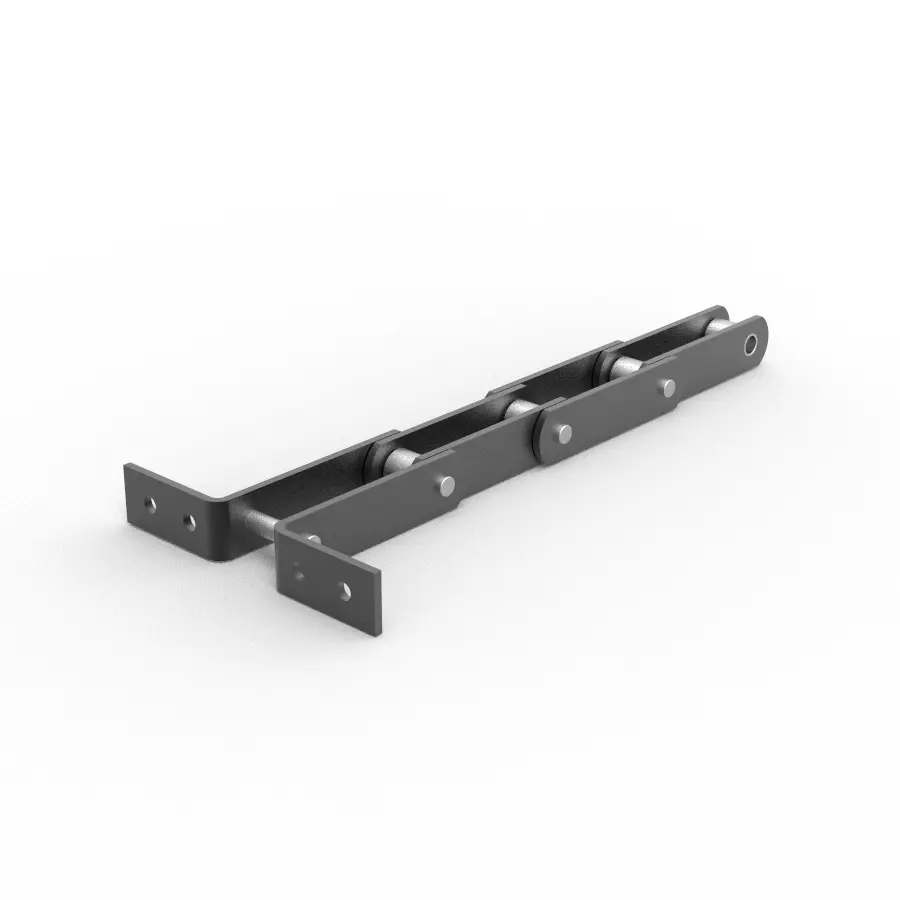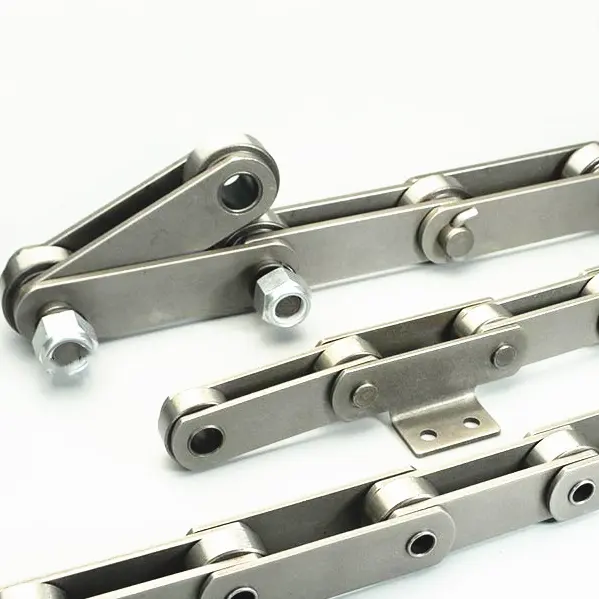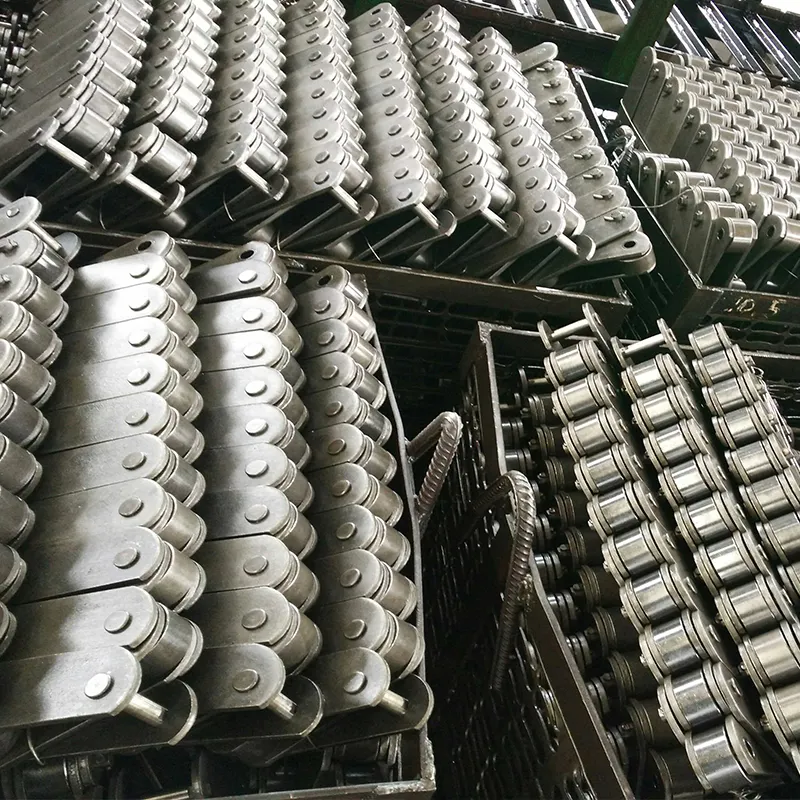Product Description
CHINAMFG rollers enhance rotation on the bushing while reducing impact loads on the sprocket tooth during operation.
All components are heat treated to achieve maximum strength.
Pre-loaded during the manufacturing process to minimize initial elongation.
Hot dipped lubrication ensures 100% lubrication of all chain components to extend wear life and reduce maintenance costs.
| CHAIN NO. |
PITCH | BUSH WIDTH |
ROLLER DIA |
PIN | PLATE | MIN. TENSILE STRENGTH |
MAX. TENSILE STRENGTH |
WEIGHT | |||||||
| d | L1 | L2 | H | t/T | |||||||||||
| mm | mm | mm | mm | mm | mm | mm | mm | KN/min | KN/min | kg/m | |||||
| US101.6 | 101.60 | 31.80 | 57.15 | 15.88 | 34.40 | 38.40 | 38.10 | 6.40 | 72.3 | 8.20 | 11.67 | ||||
| P101.6-R47 | 101.60 | 30.00 | 47.00 | 15.88 | 41.00 | 45.00 | 41.00 | 10.00 | 242.0 | 19.40 | 17.98 | ||||
| US127 | 127.00 | 38.40 | 69.85 | 19.00 | 45.10 | 51.40 | 50.80 | 9.60 | 180.0 | 20.30 | 19.22 | ||||
| P152.4-R66.7 | 152.40 | 30.00 | 66.70 | 26.92 | 35.50 | 41.50 | 50.80 | 8.00 | 167.0 | 13.40 | 16.11 | ||||
| C9060 | 152.40 | 37.70 | 69.85 | 18.90 | 45.00 | 49.30 | 50.80 | 9.50 | 250.0 | 28.20 | 17.20 | ||||
| C 0571 1 | 152.40 | 37.70 | 69.85 | 18.90 | 44.90 | 50.30 | 57.20 | 9.50 | 377.9 | 28.20 | 18.74 | ||||
| C 0571 3 | 152.40 | 38.00 | 76.20 | 23.83 | 47.10 | 54.90 | 61.90 | 10.30 | 635.0 | 36.10 | 22.27 | ||||
| 1796 | 152.40 | 37.80 | 69.85 | 76.20 | 73.00 | 22.23 | 43.90 | 53.20 | 57.20 | 9.50 | 444.5 | 33.30 | 18.50 | 19.50 | 19.20 |
| Usage: | Transmission Chain, Conveyor Chain, Dedicated Special Chain, Roller Chain |
|---|---|
| Material: | Alloy/Carbon Steel |
| Surface Treatment: | Polishing |
| Feature: | Heat Resistant |
| Chain Size: | 4"*6" |
| Structure: | Roller Chain |
| Samples: |
US$ 10/Meter
1 Meter(Min.Order) | |
|---|
| Customization: |
Available
| Customized Request |
|---|

Can mill chains be used in wastewater treatment and sewage systems?
Yes, mill chains can be used in wastewater treatment and sewage systems for various applications. These chains offer specific advantages that make them suitable for such environments, where exposure to corrosive and abrasive materials is common. Here are some key points regarding the use of mill chains in wastewater treatment and sewage systems:
1. Corrosion Resistance: Wastewater and sewage often contain corrosive substances, such as acids and chemicals. Stainless steel mill chains are particularly beneficial in these environments due to their corrosion resistance, which helps to prevent premature wear and elongation of the chain.
2. Abrasion Resistance: Mill chains are designed to handle heavy loads and resist wear and abrasion, making them suitable for applications where wastewater may contain abrasive particles, sediment, or sludge.
3. Reliability: In wastewater treatment and sewage systems, reliability is crucial to maintain smooth operations. Mill chains, when properly selected and maintained, provide reliable performance and minimize downtime.
4. High Strength: Mill chains are capable of handling heavy loads and high-capacity material transfer, making them suitable for wastewater treatment processes that involve moving large volumes of liquid or solid materials.
5. Easy Maintenance: Stainless steel mill chains require minimal maintenance, which is beneficial in wastewater treatment facilities where regular maintenance can be challenging due to the nature of the environment.
6. Resistance to Harsh Chemicals: Wastewater treatment processes often involve the use of various chemicals for treatment and purification. Stainless steel mill chains can withstand exposure to these chemicals without deteriorating or compromising their performance.
7. Extended Service Life: Due to their corrosion and abrasion resistance, mill chains can have a longer service life in wastewater treatment and sewage systems compared to conventional carbon steel chains.
8. Versatility: Mill chains come in various configurations, including standard, double pitch, and heavy-duty options, allowing for versatility in designing wastewater treatment systems to meet specific requirements.
Overall, mill chains, especially those made of stainless steel, are a reliable and durable option for use in wastewater treatment and sewage systems. Their corrosion and abrasion resistance, high strength, and low maintenance make them well-suited for handling the challenging conditions and materials encountered in these applications.

How do mill chains contribute to the efficient and reliable material transfer?
Mill chains play a crucial role in ensuring efficient and reliable material transfer in various industrial applications. Their design and characteristics make them well-suited for handling heavy loads, abrasive materials, and high-temperature environments. Here are some ways mill chains contribute to efficient and reliable material transfer:
- Strength and Durability: Mill chains are typically made from high-quality materials, such as alloy steel, which provides excellent strength and durability. This allows them to withstand the stress and load of heavy materials during material handling processes.
- Precision Engineering: Mill chains are precision-engineered to have consistent pitch and link dimensions, ensuring smooth and reliable operation in conveyor systems and material transfer equipment.
- Uniform Material Flow: The precise design of mill chains ensures uniform material flow, reducing the risk of blockages and disruptions in the material transfer process.
- Low Maintenance: Due to their durable construction, mill chains require minimal maintenance, resulting in reduced downtime and increased overall efficiency.
- High Temperature Resistance: In applications where high temperatures are involved, such as in steel mills or cement kilns, mill chains can withstand the heat without compromising their performance.
- Adaptability: Mill chains can be designed and manufactured to suit specific material handling requirements, making them versatile and suitable for a wide range of industries.
- Reduced Wear and Tear: The use of high-quality materials and precision manufacturing helps reduce wear and tear on mill chains, leading to extended service life and reliable performance.
By ensuring smooth and efficient material transfer, mill chains contribute to increased productivity, reduced downtime, and overall cost-effectiveness in industrial operations. Proper selection, installation, and maintenance of mill chains are essential to harness their full potential and achieve optimal material handling performance.

How does a mill chain differ from other types of conveyor chains?
Mill chains, also known as industrial chains or conveyor chains, have several distinct features that set them apart from other types of conveyor chains. Here are some key differences:
1. Design and Construction: Mill chains are specifically designed for heavy-duty industrial applications, such as steel production, lumber handling, mining, and more. They are built with robust construction and larger link plates to handle heavy loads and resist wear and tear.
2. Attachment Type: Mill chains often come with various attachment options, such as extended pins, K attachments, or slotted attachments. These attachments allow the chain to engage with the conveyed materials and provide a secure and efficient method of transporting them.
3. Material: Mill chains are commonly made from high-quality materials, such as carbon steel or stainless steel. This choice of material ensures durability, resistance to corrosion, and the ability to withstand harsh operating conditions.
4. Application: While some other types of conveyor chains are suitable for lighter-duty applications, mill chains are specifically designed for heavy-duty and high-stress industrial applications. They are commonly used in industries like steel mills, lumber processing, mining, and other heavy industries.
5. Load Capacity: Due to their robust design and construction, mill chains have a higher load capacity compared to standard conveyor chains. This allows them to handle large and heavy materials in industrial settings.
6. Speed: Mill chains are typically used in applications where the conveying speed is slower compared to some other types of conveyor chains. The focus is on moving heavy materials with precision and control rather than achieving high conveying speeds.
Overall, mill chains are engineered for heavy-duty and demanding applications that require reliable and efficient material handling. They are a crucial component in various industrial processes, providing smooth and controlled movement of materials in challenging environments.


editor by CX 2023-11-03